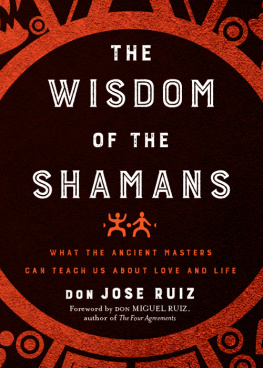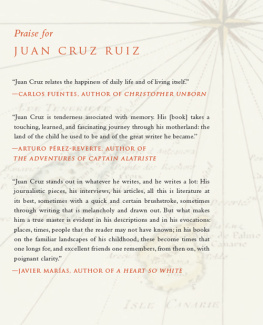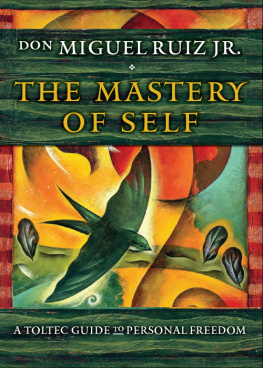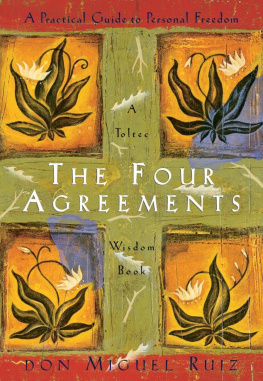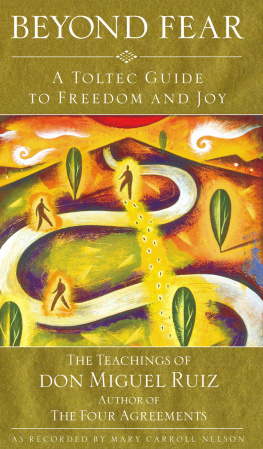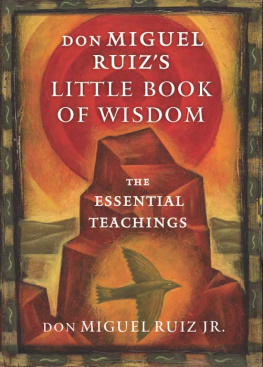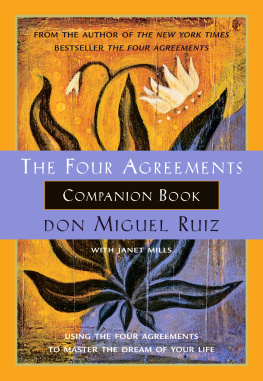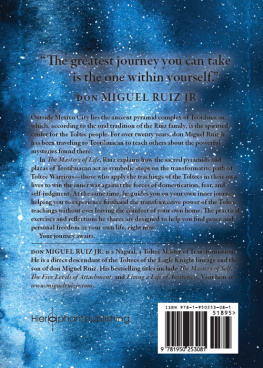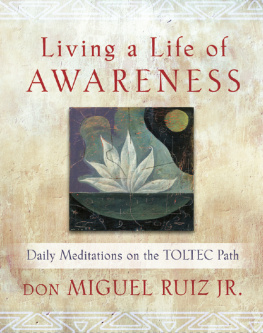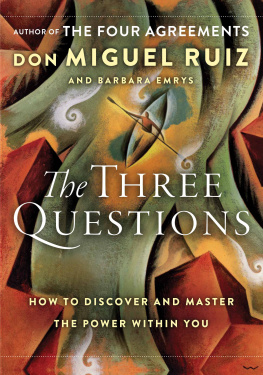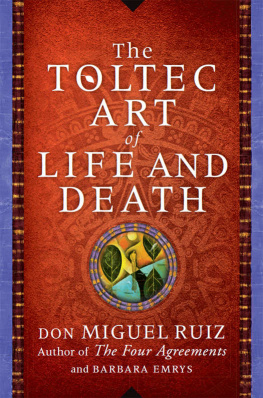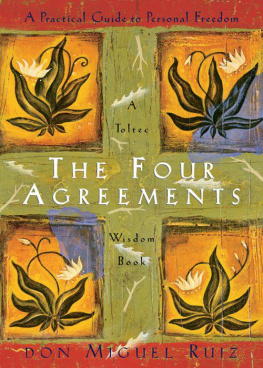

Copyright 2018 by Don Jose Ruiz
First Paperback Edition 2019
All rights reserved, including the right to reproduce this work in any form whatsoever, without permission in writing from the publisher, except for brief passages in connection with a review.
Cover design by Emma Smith
Cover art by Eky Studio || Shutterstock & Weredragon || Shutterstock
Interior Design by Frame25 Productions
Hierophant Publishing
8301 Broadway, Suite 219
San Antonio, TX 78209
888-800-4240
www.hierophantpublishing.com
If you are unable to order this book from your local bookseller, you may order directly from the publisher.
Library of Congress Control Number: 2019930193
ISBN: 978-1-938289-84-2
10 9 8 7 6 5 4 3 2 1
Printed on acid-free paper in the United States
www.redwheelweiser.com
www.redwheelweiser.com/newsletter
CONTENTS
FOREWORD
Imagine being alive hundreds, even thousands, of years ago. You are sitting at the edge of a fire, at the dawn of human memory. Others are gathered around the warm glow of the flames with you, and you are all bathed in the light of a sacred circle. Leaning forward into the light, one person begins to speak. A log cracks, sending a burst of embers into the dark sky. The story begins:
Once, there was a woman who found herself lost in the desert. She wandered for days under a sky heavy with clouds. Folded in layers of darkness, she stumbled across the landscape, her hands empty and her skin cold. Finally, exhausted, she sank to her knees and turned her face to the heavens.
There, she saw that the clouds had opened, revealing a wash of bright stars. She stared up at them. Each one, she thought, has sent its light to me. The glow of each stareven those that died millennia agois reaching me right now. But what has the light reached? What am I? What is the truth of me?
You see in your mind's eye the light of the stars and feel the lesson in the words settle into your heart. The story has brought a reflection of the truth. It has opened you to the idea that you are not your roles, your desires, your destiny, or even your body. The truth is that we have no idea what we are; all we know is that we are.
The truth often needs a mirror, as sometimes we cannot see the truth itselfonly its reflection. Since ancient times, teachers, masters, and shamans have reflected the truth through storytelling. It is perhaps the oldest forms of teaching, and while the words may disappear as soon as the story is over, the lessons they teach us can last for a lifetime.
As we move through the world, the mind tells a million stories a day. For instance, I could put two random words on a page:
Attic Proud
Already your mind has gone to work. You've found a connection, perhaps several, and the stories are beginning to send seeds into the earth so they can flower. We can't help itour minds are storytelling machines.
Because of this, we could say that stories are like an element of the mind, just as earth, water, air, and fire are elements of the body. Like the primordial elements, stories can cleanse, burn, reveal, or create, and the lessons they teach us can be used to build bridges, make heartfelt connections, and reveal powerful ideas that lead us in the direction of truth.
In the book you are holding right now, don Jose Ruiz, my second son, shares the wisdom of our family's shamanic tradition. This wisdom has been handed down, generation after generation, in the form of stories. He also shares with you his own truth about the deeper meaning these stories reflect.
While stories are part of our dream of reality and we give them their due, we must remember that they are only reflections of the truthnot truth itself. As you will soon learn, the truth you seek is inside of you, and these stories, as well as your own story, can only point you to that truth.
Wisdom is the realization that you have a choice in your story. If you don't like the story you are living, I invite you to write a new one. Let the wisdom in this book be your guide to doing so.
don Miguel Ruiz
author of The Four Agreements
PREFACE
Much has been said and written about the North and Central American shamans since Europeans first began arriving in the Americas en masse over 500 years ago. They have been called everything from witch doctors to medicine men and even sorcerers. Their ideas about life were often considered primitive, uneducated, superstitious, and otherwise not as enlightened as their European counterparts.
Shamans were almost always assumed to be men, a presumption proven to be based more on the bias of those who wrote about them than on historical fact. Personally, this idea never occurred to me, because when I was growing up, my grandmother was the most powerful shaman in our family.
Linguistically, the word shaman would have meant nothing to the vast majority of native cultures outside those groups in northeast Asia where the term likely originated. In my own tradition, that of the Toltec people of what is now Mexico, the shamans were called naguals, meaning the awakened ones, in our native Nahuatl language. It's interesting to point out that the word nagual has an additional meaning: it is also the word for the life force energy, the divinity that we all have inside of us. Taken together, we can see that the Toltecs believe that everyone is a nagual, but the shamans are the ones whose eyes are open to this realization.
For uniformity, and because any word in itself has no meaning without our agreement, I will use shaman throughout this book to describe a person who is awakened to the realization that we are all this fundamental life force energy, as this is the most familiar term in the modern world.
On a global scale, shamanism refers to the spiritual tradition or religion of native cultures around the world. These spiritual traditions are said to have certain things in common: a respect for nature, a respect for all life, and a respect for their ancestors. While this is all true, this is only the barest of beginnings of what it means to practice shamanism.
The good news is that we are seeing these old ideas about shamanism open up more in recent times, thanks in part to the work of my father, don Miguel Ruiz, as well as Carlos Castaneda and many others. The modern world is beginning to catch up to what my family has known and passed down via oral tradition for more than a thousand years, namely that the shamans were both men and women and that their ideas were anything but primitive. In fact, the roles they played in their communities were a sophisticated combination of philosopher, spiritual leader, medical doctor, psychologist, and friend.
Seen in this context, certain questions begin to arise: What did these ancient masters know? How did they acquire and pass down this knowledge? And can this knowledge help us in the way we live our lives in the modern world? Answering questions such as these is the purpose of this book.
As you will see in the pages that follow, it is my personal belief that the wisdom of the ancient masters was not something primitive or reserved only for men, but a complex and powerful series of teachings available to all of humankind. It is the wisdom of waking up, of finding your own personal freedom, of living in peace and harmony, and of being of service to others and the planet.
Next page
